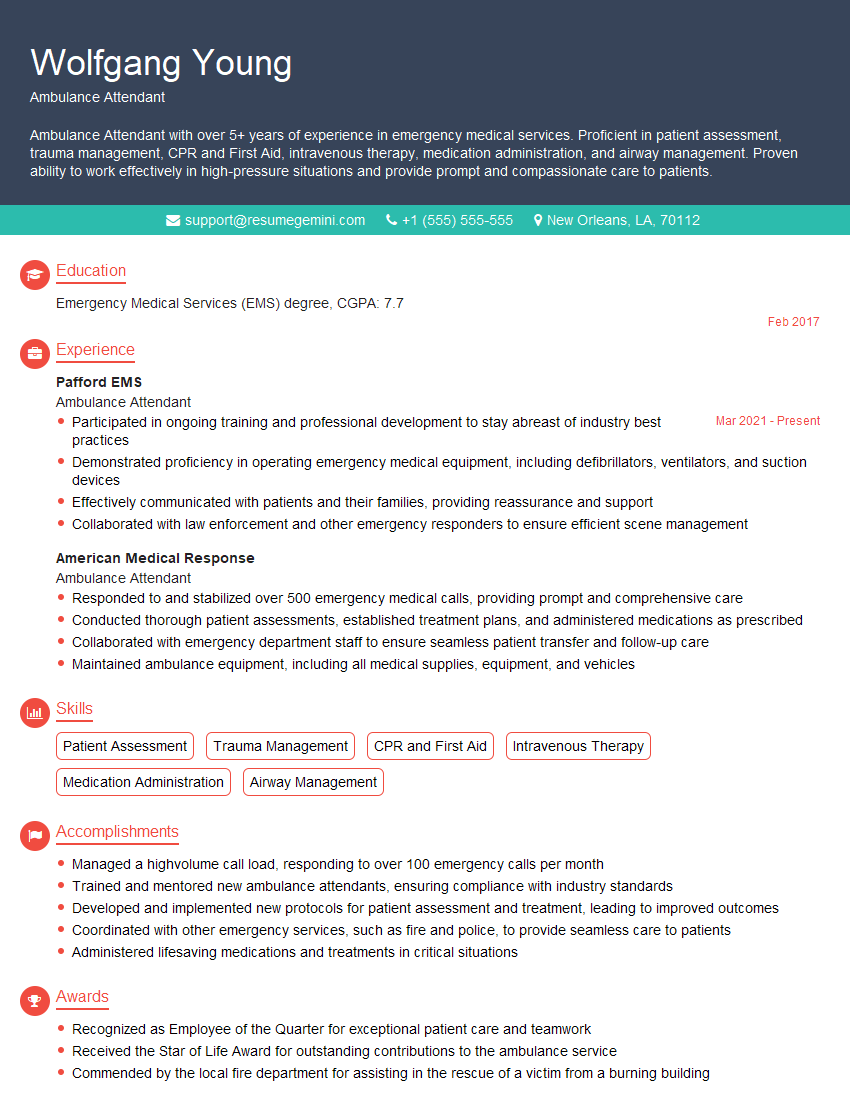Are you a seasoned Ambulance Attendant seeking a new career path? Discover our professionally built Ambulance Attendant Resume Template. This time-saving tool provides a solid foundation for your job search. Simply click “Edit Resume” to customize it with your unique experiences and achievements. Customize fonts and colors to match your personal style and increase your chances of landing your dream job. Explore more Resume Templates for additional options.

Wolfgang Young
Ambulance Attendant
Summary
Ambulance Attendant with over 5+ years of experience in emergency medical services. Proficient in patient assessment, trauma management, CPR and First Aid, intravenous therapy, medication administration, and airway management. Proven ability to work effectively in high-pressure situations and provide prompt and compassionate care to patients.
Education
Emergency Medical Services (EMS) degree
February 2017
Skills
- Patient Assessment
- Trauma Management
- CPR and First Aid
- Intravenous Therapy
- Medication Administration
- Airway Management
Work Experience
Ambulance Attendant
- Participated in ongoing training and professional development to stay abreast of industry best practices
- Demonstrated proficiency in operating emergency medical equipment, including defibrillators, ventilators, and suction devices
- Effectively communicated with patients and their families, providing reassurance and support
- Collaborated with law enforcement and other emergency responders to ensure efficient scene management
Ambulance Attendant
- Responded to and stabilized over 500 emergency medical calls, providing prompt and comprehensive care
- Conducted thorough patient assessments, established treatment plans, and administered medications as prescribed
- Collaborated with emergency department staff to ensure seamless patient transfer and follow-up care
- Maintained ambulance equipment, including all medical supplies, equipment, and vehicles
Accomplishments
- Managed a highvolume call load, responding to over 100 emergency calls per month
- Trained and mentored new ambulance attendants, ensuring compliance with industry standards
- Developed and implemented new protocols for patient assessment and treatment, leading to improved outcomes
- Coordinated with other emergency services, such as fire and police, to provide seamless care to patients
- Administered lifesaving medications and treatments in critical situations
Awards
- Recognized as Employee of the Quarter for exceptional patient care and teamwork
- Received the Star of Life Award for outstanding contributions to the ambulance service
- Commended by the local fire department for assisting in the rescue of a victim from a burning building
Certificates
- EMTB
- EMTP
- Paramedic
- ACLS
Career Expert Tips:
- Select the ideal resume template to showcase your professional experience effectively.
- Master the art of resume writing to highlight your unique qualifications and achievements.
- Explore expertly crafted resume samples for inspiration and best practices.
- Build your best resume for free this new year with ResumeGemini. Enjoy exclusive discounts on ATS optimized resume templates.
How To Write Resume For Ambulance Attendant
- Highlight your relevant skills and experience in your resume.
- Quantify your accomplishments whenever possible.
- Get feedback on your resume from a healthcare professional or career counselor.
- Practice your interviewing skills and be prepared to answer questions about your experience and why you’re interested in the position.
Essential Experience Highlights for a Strong Ambulance Attendant Resume
- Responding to emergency calls and providing prompt medical attention to patients
- Assessing patient’s condition, performing necessary medical interventions, and stabilizing them for transport
- Communicating with hospital staff and coordinating patient transfers
- Maintaining a clean and well-stocked ambulance
- Assisting with patient education and providing support to family members
- Participating in continuing education programs to stay updated on latest medical techniques
Frequently Asked Questions (FAQ’s) For Ambulance Attendant
What are the job duties of an Ambulance Attendant?
Ambulance Attendants provide emergency medical care to patients in a variety of settings, including accidents, natural disasters, and medical emergencies. They work closely with paramedics and emergency medical technicians (EMTs) to assess patients’ conditions, provide treatment, and transport them to hospitals or other medical facilities.
What are the qualifications for becoming an Ambulance Attendant?
Most Ambulance Attendants have a high school diploma or equivalent and have completed a state-approved EMT or paramedic training program. They must also be certified in CPR and first aid.
What are the career prospects for Ambulance Attendants?
Ambulance Attendants can advance their careers by becoming paramedics, emergency medical technicians, or other healthcare professionals. They may also choose to specialize in areas such as critical care, trauma care, or neonatal care.
What is the salary range for Ambulance Attendants?
The salary range for Ambulance Attendants can vary depending on their experience, location, and employer. According to the U.S. Bureau of Labor Statistics, the median annual salary for EMTs and paramedics was $36,960 in May 2021.
What are the working conditions for Ambulance Attendants?
Ambulance Attendants work in a variety of settings, including ambulances, hospitals, and other medical facilities. They may work long hours, including weekends and holidays, and may be exposed to hazardous materials and infectious diseases.
What are the benefits of working as an Ambulance Attendant?
Working as an Ambulance Attendant can be a rewarding career that offers the opportunity to make a difference in people’s lives. Ambulance Attendants can also gain valuable experience and skills that can be used in other healthcare settings.
What are the challenges of working as an Ambulance Attendant?
Working as an Ambulance Attendant can be physically and emotionally demanding. Ambulance Attendants may be exposed to traumatic events and may have to make difficult decisions under pressure.